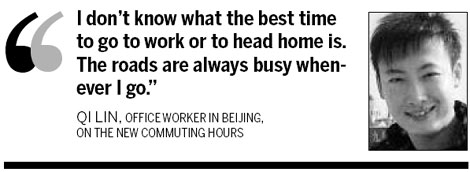Focus
... and make getting to work more stressful for all
By Wang Wen (China Daily)
Updated: 2010-04-26 08:12
 |
Large Medium Small |
The worst part of Qi Lin's day is his commute to and from work.
"I don't know what the best time to go to work or to head home is," said the 25-year-old office worker. "The roads are always busy whenever I go."

The new working hours for the 800,000 civil servants in Beijing, are confusing commuters. Rush hours are longer than before and many commuters say Beijing's roads are much busier than before even in non-peak traffic hours.
Qi said his daily schedule has been a mess ever since the new working hours began.
"Government employees start work a half hour later, as part of the new regulations, and it seems there are more people that ever heading to their offices at 9 am," said the white collar worker, who travels to his office in the central business district in east Beijing from his apartment in west Beijing's Wuzhuang area in Shijingshan area. It usually takes him an hour to get from his home to work or vice versa.
Qi used to take his time in the morning, before the new working hours came into effect, getting on an eastbound subway just before 8 am. There was never any problem getting on the subway and he always got to his office with plenty of time to spare, he said.
This month, however, has been a different story. "The subway stations are absolutely packed, even until 9 am. This used to be a time when most people were already at work," he said.
| ||||
Qi said he has already been late for work twice in the past two weeks because of unexpected crowds on the subway, even though he has been leaving his home much earlier than he used to.
"Everybody is probably leaving their house earlier than they previously did - even government employees - just to ensure they have enough time to battle the morning crowds and get to the office on time," said Qi.
Some civil servants told METRO that they don't see much advantages in the new working hours because they are wasting more time on the roads or on public transport.
"There is no point in asking us to start work later because there are still flocks of commuters on the roads, including a large number of people who work for private companies and start at 9 am," said Jia Kang, a civil servant who works for Beijing's urban inspection authority.
Jia takes the subway from the southern part of the capital to his office near the Dongsi area in downtown Beijing each morning. Before the new work hours started, he left home at 7 am and got to his office an hour later for breakfast.
The ride up is much more crowded now and he doesn't get to eat breakfast until 9 am, he said,
"I am starving by then," he added.
The new work hours present as many problems in the evening as in the morning, said Qi and Jia.
"I have tried to leave the office both at 6 pm and at 7 pm, but they both seem to be the same. There are more people than usual whenever I go," Qi told METRO.
Jia also said a lot of his colleagues deliberately leave the office late to try and avoid the evening rush hour.
"We usually hang out after work and head home only after the rush hour comes to an end, but even this does not always work," Jia said.
He also said the last half an hour at work is boring, because most workers would have finished their assignments at 5:30 pm.
"We just sit there and wait to clock out, doing nothing," said Jia.








